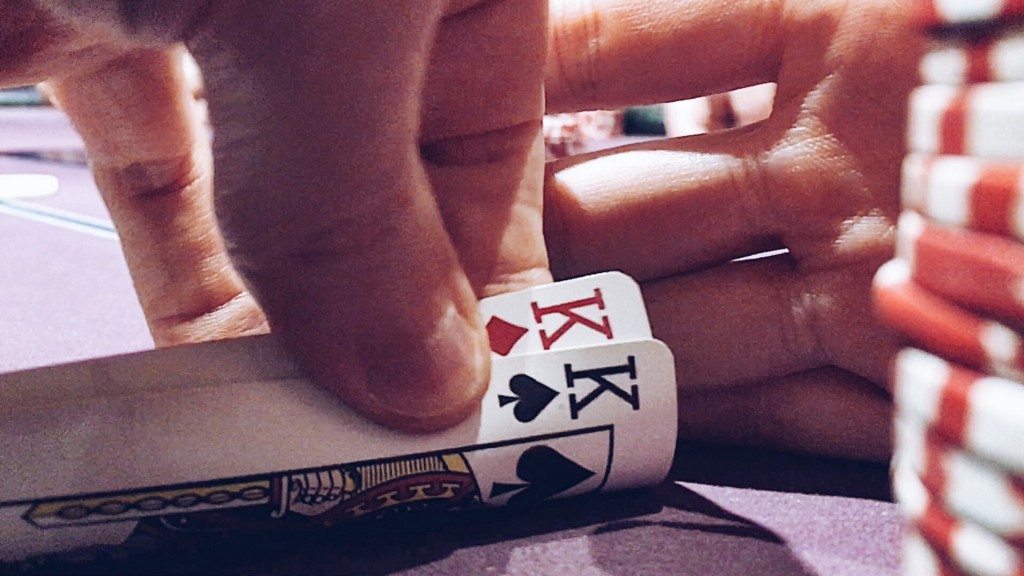Royal Flushes and Finance
Talking big wins and how to manage money with poker pro Andrew Neeme.

It’s summertime and the 48th annual World Series of Poker is in full-swing. Poker players from all walks of life have made their way to Vegas to compete in the world’s most anticipated poker tournament series of the year for a total of 74 gold WSOP bracelets.
Prior to the start of the tournaments, I got a chance to talk with professional poker player Andrew Neeme—who has spent the past nine years hitting the felt full-time to make a living.
While Neeme hasn’t had any million-dollar life-changing tournament cashes, he’s become a bit of a poker celebrity over the past year after launching a YouTube vlog that has exploded in poker circles around the world. When Neeme takes to the casino at night to play No Limit Texas Hold’em into the early morning, he takes his audience with him to give them an inside look at the life of a poker grinder while sharing some tips along the way.
I talked with Neeme about how he got into gambling professionally, the cost of living in Las Vegas, and how he manages his winnings in such an up-and down job.
SH: How did you get into poker and what made you decide to turn it into a full-time profession?
AN: I started my professional career in the music industry, actually. I was in London and then Los Angeles. I was beginning to play poker online when I was there. Online poker was so huge back then — this was around 2004, 2005—everything was really ramping up in the poker world, both online and live. The games online were much easier than they are these days.

I wasn’t taking it too seriously overall. I was still pursuing the job life. I was playing recreationally online, but slowly got a little more interested in it and discovered that you can do better for yourself the more you study.
As time went on, I started doing a little better for myself and it kind of coincided with the economy slowing down a bit toward 2007, 2008. The job I was in at the time — there were some projects that were supposed to happen that ended up not happening. So one thing was ramping up while the other was winding down. I was just playing more and more poker as the job was slowing down.
It was just one of those things where you end up falling into it really. The timing of it all just sort of happened.
What was the transition between careers like — going from a stable job to one where you’ve got to put your own money at risk to make a living?
The cool thing about poker, especially in the online games, is that there are so many steps on the ladder. You can start very small, with money the vast majority of people aren’t going to to worry about losing. You can hop on with a $5 deposit and play in a game with $0.01/$0.02 blinds.
Then you can slowly work your way up the ladder to where you’re playing bigger and bigger stakes. You can take it really slowly. It’s not like you’re going from a paycheck into risking thousands of dollars. It’s a slow and steady process, it’s a gradual process.
What’s your schedule look like? Do you set time or monetary goals?
Before I started the vlog, my monthly goal was somewhere around 150 hours of playing time. A lot of people say 40 hours a week is a normal full-time job. I try to shoot for somewhere around there, but the hours are going to be really draining.
When you’re playing poker, it’s some of the most engaged hours of work imaginable. You have to be very focused, very aware and you want to be paying attention to so many different things, not to mention that your adrenaline levels can be going up and down as various things happen over the course of a hand or the game.
I would shoot for an hours goal rather than a monetary goal, because in the short-term you don’t have a lot of control over the variance of the game. There is going to be a lot of fluctuation in the short-term. If you set monetary goals, you’re often going to not reach that goal. And sometimes you can even overshoot that goal and then you might develop a sense of overconfidence.
In the short-term you don’t have a lot of control over the variance of the game.
Over time you want to develop your win-rate—the amount of money won divided by the amount of hours that you’ve played. You take that rate and look at your expenses. Then you put in X number of hours to cover that and whatever extra you need on the side.
In poker, you’ll have a good day when you win $1,000 or something— you win the same amount someone else might make in a week in one session. But you’ve got to look at the bigger picture. Instead of looking at what you made that day, you look at how much you made that month and look at your win-rate. You have to go off of those calculated numbers.
What’s been your worst lost? What’s been your biggest win?
As far as cash games go, it’s a pretty similar number and it’s not that wild of a number. I think it’s around $4,500 in day, both ways. My biggest tournament win was about $10,500 and that was also just one day.
How do you deal with losses like that?
You’ve just got to shrug it off, as painful as losing $4,500 playing a card game can be.
It’s okay for it to feel crappy, though. When I was starting to play, we looked at guys like Phil Ivey, who just seemed so emotionless, so stone-cold through the swings of it all—and then when you start playing and you lose and you feel like crap, you start beating yourself up for feeling bad.
I’ve learned that it’s perfectly natural to feel bad. You don’t have to be a machine. The most important thing is not changing up your solid playing style and continuing to make good decisions even through losses.
How do you manage your winnings?

The general guideline for players is to have around three months of living expenses in an account that’s separate from poker. Anytime that “liferoll” of living expenses dips down, it needs to be replenished by the bankroll or your winnings.
I’ve never been the best at keeping everything separate. I know that one is always replenishing the other — it’s always kind of mixing here and there.
The general guideline for players is to have around three months of living expenses in an account that’s separate from poker.
I think it helps people to mentally compartmentalize things, like “if this money is here, I know I’m going to be okay for three months no matter what,” which makes sense. But I think the thing that’s more important is keeping your spending habits as low as possible when you’re trying to build up a bankroll. As your bankroll increases, it allows you to play higher stakes games and, as a result, you increase your earning power.
Keep your spending habits as low as possible when you’re trying to build up a bankroll.
You’ve got to keep tabs on how much you’re making and how much you’re spending.
How often do you take notes on your wins, losses, and spending?
You need to be doing it every single day, after every single session — for the reasons I just stated and for tax purposes. You’re supposed to be reporting that on your own every year.
And you’ve got to be keeping track because you can deduct various things. When you file as a professional gambler you can deduct things like travel, when you take a business trip — like when you go play a tournament in a different city. If you don’t cash in that tournament, that’s a loss you deduct against your winnings.
I basically knew nothing [about money management] when I got into playing, which I think is pretty normal. But luckily there are things like Google, and friends who can point you in the right direction. Here in Vegas, my tax professional is a gambling tax professional, so he’s on top of all the latest developments in tax land and all the deductions you can take as a gambler.
Can you talk about variance and the role that plays in your job?
It’s not a very easy thing to deal with. You can play it perfectly, you can get all the money in with the best hand and a lot of times you’re still only gonna be at 80 percent to win that particular hand once all the cards are dealt.
You have to take a look at it from a mathematical stance — I’m going to be getting the money in good and I’m still going to lose a certain number of times. The way you combat that is to have a stable bankroll to cushion all those losses. Sometimes they’ll come four, five, six times, all in a row. You deal with it both mentally—you prepare yourself and understand that things aren’t always going to go well for you—and you deal with it financially by having that extra padding.
I’m going to be getting the money in good and I’m still going to lose a certain number of times.
Honestly, I don’t think it’s very different from a lot of other aspects of life. You can live your life and things are going well, but then someone ends up getting sick or someone gets in an accident or something like that — bad things happen in life. It had nothing to do with you, but now it’s a setback. Over time you just have to be willing to roll with the punches a bit.
Let’s talk about the vlog. Is that a source of income for you now?
It’s monetized, but it takes a while to build up a subscriber base to where it really supplements your income. It’s hard to figure out YouTube’s algorithm, but I think the ad payout is something like $1.50 per 1,000 views. [Neeme’s videos usually get anywhere between 60,000 and 100,000 views.] It helps pay some bills.
But it’s definitely not the same level of income that it would’ve been if I had been putting in those hours at the poker table. It’s a decent pay cut in the short-term.
Are there moments when you think about how much more money you’d be making at the poker table instead of editing the vlogs?
For sure. The hours tallied so far, it’s around 350–400 hours or so that we’ve played since starting the vlog in October. Really that only equates to two or three months of playing. So it’s a pay cut.
But then I remind myself that the reasons I started doing [the vlogs] wasn’t because I thought it would be a money press. It’s because I wanted to do something a little more creative. Grinding it out at the poker tables isn’t exactly fulfilling creatively and you’re doing it on your own.
Sometimes I think that it’d be nice to to turn off the camera and go to the poker table without worrying about getting all of the shots or the editing afterwards. But about a week after that I think it’d be back to the old grind again, just poker without purpose. For some people that’s perfectly fine and that’s cool, everyone has their own reasons for the work that they do.
Have you ever considered hiring an editor or content manger?
I’ve definitely considered it. I’ll be sitting there inputting my hand histories into the latest video and just thinking that someone else could be doing this. It’s a little bit tough because it’s a specific skillset—they’d need to be a good editor and understand the intricacies of poker. I go back and forth on it. We’d definitely be able to crank content out more regularly and I’d be able to spend more time at the table.
How do you manage enjoying Las Vegas and all that it has to offer when you’re thinking about budgeting so often?
Las Vegas teaches you a lot about yourself just because the city encourages you to indulge in everything and not worry about the repercussions.
It’s the same as anywhere else, though. When you’re starting out you can get roommates to keep living expenses low. You go to happy hour instead of staying out late at the bar and paying full prices. There are locals’ discounts at some places. All that unsexy stuff.
You just have to be mathematical about it all.
Las Vegas teaches you a lot about yourself just because the city encourages you to indulge in everything and not worry about the repercussions.
The cost of living here is very low. My fiancée and I live in a pretty modern two-bedroom apartment in the downtown area. We’re definitely not like ballin’ out or anything.
Compared to cities that have the same level of entertainment available, like LA, San Francisco, New York, Miami, it’s definitely cheaper to live here.
What do you like/dislike about your job?
The best part about playing cards for a living is the freedom. Being able to set any kind of schedule that you want, whether that’s daytime or nighttime. There are so many casinos across the U.S., so you can take some business trips to a lot of different places. I grew up in Michigan and there are three casinos in Detroit, so every time I go home to see my folks I can make it a business trip and put some hours in at the table. That’s the cool part, the freedom — being able to call it a day whenever you want.
The biggest downside is … for me, it’s pretty tough not knowing what your net worth is going to be at the end of X time period. It can make it a little difficult to plan things, whether that’s a trip or if someone you know is getting married. Or even if you want to upgrade your standard of living a little bit, or you want to move. You want to be able to afford these things. It can make it tough to plan all that stuff out.
Sam Hill is a journalist living in Portland, Maine. You can follow him on Twitter: @samahill
Support The Billfold
The Billfold continues to exist thanks to support from our readers. Help us continue to do our work by making a monthly pledge on Patreon or a one-time-only contribution through PayPal.
Comments